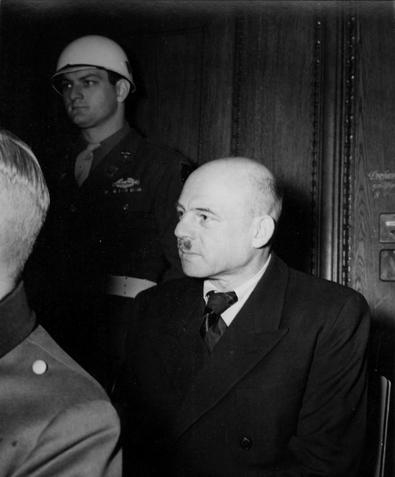Final statement Fritz Sauckel
THE PRESIDENT: I call upon the Defendant Fritz Sauckel.
FRITZ SAUCKEL (Defendant): Gentlemen of the Tribunal: I have been shaken to the very depths of my soul by the atrocities revealed in this Trial. In all humility and reverence, I bow before the victims and the fallen of all nations, and before the misfortune and suffering of my own people, with whom alone I must measure rny fate.I come from a social level completely different from that of my comrades accused with me. In my nature and thinking I remained a sailor and a worker.
After the First World War, the course of my life was determined through my own experience of the sorrows and needs of the masses of my people who were struggling for their existence. Inner conflicts forced me into politics. I could be nothing else but a Socialist but I could not embrace the Communist manifesto. I was never anti-religious or even irreligious, but quite the contrary. I fought a hard struggle with myself before I turned to politics.
And so I finally dedicated myself to socialist love and justice toward those whose only wealth is their labor and, at the same time, to the destiny of my nation. In this I saw the only possible connection between socialist thinking and true love of one's country. This belief alone determined my life and my actions.
I saw here no contradiction to the laws of humanity. I recognized no arbitrary dictatorship or tyranny in the principle of leaders and loyal foIlowers. My error was perhaps the excess of my feelings and my confidence in, as well as my great veneration of Hitler. I knew him only as the champion of the German people's rights to existence and saw him as the man who was kind to workers, women and children and who promoted the vital interests of Germany.
The Hitler of this Trial I could not recognize. Perhaps my loneliness and submersion in the world of my imagination and my work was a further defect.
I hardly ever had social contact with the occupants of high positions in the Reich; what little spare time I had belonged to my family. I was and am happy that my wife is the daughter of a worker, who himself was and remained a Socialdemocrat.
In this, my last word, I solemnly assure you that I was completely surprised by all foreign political events and the beginning of all military actions. Under no circumstances would I have co-operated as a German worker - and for German workers - to help plan the madness of unleashing a war of aggression.
I only became a Nationalsocialist because I condemned class struggle, expropriation and civil war, and because I firmly believed in Hitler's absolute desire for peace and understanding with the rest of the world and in his work of reconstruction. Because I was a worker, I always did everything possible in my own field of activity to prevent excesses, arbitrary acts, and brutality of any kind. I was sufficiently naive, against the opposition of Himmler and Goebbels, to put through my manifesto and many other decrees for the employment of labor, which prescribed humane and correct treatment of foreign workers as compulsory for all offices. I never would have been able to bear the knowledge of these terrible secrets and crimes without protest nor, with such knowledge, would I have been able to face my people or my 10 innocent children.
I had no part in any conspiracy against peace or against humanity, nor did I tolerate murders or mistreatment. During the war itself I had to do my duty. I received the position of Plenipotentiary General for the Allocation of Labor in 1942, at a time of grave military crisis and it came as a complete surprise to me. I was bound by the existing labor laws, the orders of the Führer and the decrees of the Reichsverteidigungsrat. I do not know why it was just I who received this task. In my own Gau, I had particularly gained the confidence of the workers, farmers and artisans, and even before 1933, that is, before Hitler assumed power, I had been elected by a large majority in free parliamentary elections as the chief of the state government there.
I believe that Providence endowed me with a good talent for organization and practical work, as well as with a capacity for enthusiasm. Perhaps that was the reason why I received my task. It was a heavy burden for me. The soil of Berlin was completely alien to me. Because I am a worker, I never thought of making slaves of foreign human beings. My requirement that people be managed economically does not in any way mean their inhuman exploitation, but rather their economic, rational, and correct employment in labor.
It was never my intention to commit crimes against international law, the laws of war or the laws of humanity. Not for a single moment did I doubt the legality and admissibility of my task, for I thought it completely out of the question that the German Government would break international law.
If however, you tell me that, in spite of that, German labor laws could not be applied in the occupied territories, then I beg to reply that even high-ranking Frenchmen, Belgians, Poles, and also Russians have told me that they were supporting Germany with labor in order to protect Europe against a threatening Communist system and in order to prevent unemployment and mass suffering during the war.
However, not only did I work for the fulfilment of my task with the greatest zeal, but at the same time I tried with all my might and with all possible means, immediately upon assuming office, to eliminate the critical conditions in the organization and care of foreign laborers, which had developed through the winter catastrophe of 1941 to 1942 and to do away with all shortcomings and abuses.
I also believed, as my documents prove, that we could win the foreign workers over to our German cause by giving them the proper treatment I demanded. Perhaps in the eyes of Himmler and Goebbels I was a hopeless Utopian, they were my foes. But I honestly fought to have the foreign workers receive the same rights and conditions as the German workers. This is also attested to by the numerous documents of my defense counsel and has been confirmed by all the statements of the witnesses before this Tribunal.
If my work was incomplete nobody can regret it more deeply and painfully than myself. Unfortunately that was only partly in my power, as my counsel has proved.
The evidence has shown that things happened in the occupied territories on which I and the labor employment office, which was civilian-controlled, could exercise no influence whatsoever. However, all German enterprises and agencies requiring labor complained to me that I was always delivering too few workers for the war effort and that it would be my fault if the war economy and food economy were threatened by dangerous crises. These heavy responsibilities and worries dominated me so much that I found and had no time at all for other developments. This I regret.
I assume responsibility for my decrees and for my employees. I never saw the records of the Central Planning Board before this Trial; otherwise I would have corrected false or unclear passages, as, for instance, the passage with reference to the impossible figure of only 200,000 volunteer workers. This also applies to a number of other statements which were incorrectly taken down by third parties and never actually put into practice.
Because I am a worker and have personally served on foreign ships, I am grateful to the foreign workers who were in Germany, for they helped us greatly and they worked well. This, perhaps, is proof of the fact that on the whole they were treated decently and humanely. I myself often visited them. Because I was a working man, I spent the Christmas celebrations of 1943 and 1944 with foreign workers in order to show my attitude towards them.
My own children worked among foreign workers, under the same working conditions. Could I, or German workers and the German people, consider that as slavery? The necessity for this was our emergency. The German people and the German workers would never have tolerated conditions comparable to slavery around them.
My defense counsel has presented the complete truth about my case with extreme objectivity. I thank him for this from the bottom of my heart. For his own part, he was strict and correct in investigating my case. My intentions and conscience are clean.
The shortcomings and the necessities of the war, the frightful conditions it produced, have touched my heart deeply.
I myself am prepared to meet any fate which Providence has in store for me, just like my son, who was killed in the war.
The Gauleiter whom I employed as plenipotentiaries for the allocation of labor had the sole task of providing for the proper treatment and care of the German and foreign workers.
God protect my people, whom I love above all else, and may the Lord God again bless the labor of German workers, to whom my entire life and effort were devoted, and may He give peace to the world.
See also: Verdict Sauckel
Definitielijst
- dictatorship
- A form of government where the power in a country is in the hands of one person, the dictator. Originally a Roman regime in case of an emergency where total power would rest with one person during six months in order to face a crisis.
- Führer
- German word for leader. During his reign of power Adolf Hitler was Führer of Nazi Germany.
- Gau
- “Shire”. District in the Third Reich established by the NSDAP.
- Gauleiter
- Leader and representative of the NSDAP of a Gau.
Images
 Fritz Sauckel, Plenipotentiary General for the Allocation of Labor. Source: Truman Library.
Fritz Sauckel, Plenipotentiary General for the Allocation of Labor. Source: Truman Library.Information
- Published by:
- Arnold Palthe
- Published on:
- 06-01-2016
- Last edit on:
- 10-01-2019
- Feedback?
- Send it!
Sources
International Military Tribunal, Nuremberg 1947



